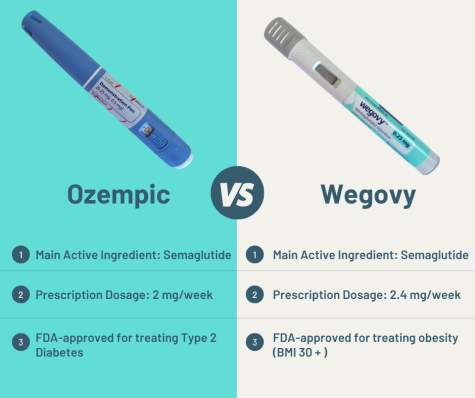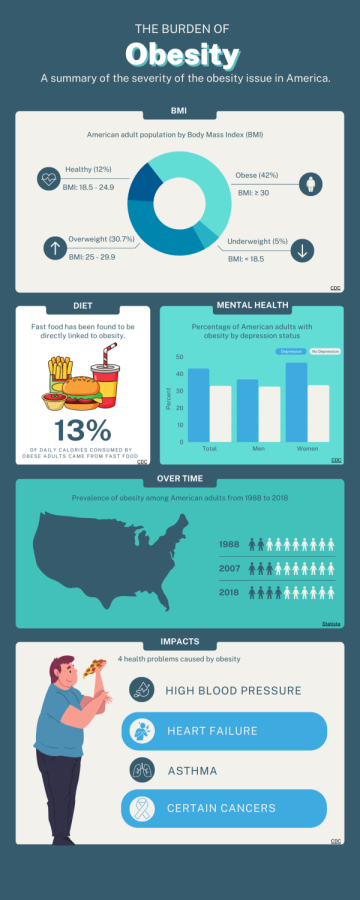With over 799.2 million views on TikTok and 58,000 posts on Instagram, the hashtag #Ozempic has been trending across social media platforms as a miracle weight loss hack, contributing to the months-long drug shortage and bringing attention to the American obesity issue.
Manufacturing problems with another drug, called Wegovy, also contributed to the shortage. Ozempic and Wegovy are injectable medications with the active ingredient semaglutide; Ozempic, however, is FDA-approved for Type 2 diabetes, while Wegovy is approved for weight loss.
When Novo Nordisk, the pharmaceutical company that produces Ozempic and Wegovy, faced production issues with Wegovy, doctors had no choice but to prescribe Ozempic to help patients control their weight, which strained Ozempic production.
“We were trying to get our patients what we could get, especially in patients that had already started on weight loss medication. We didn’t want to interrupt their treatment because we know that interrupting obesity treatment will result in weight gain,” said Dr. Daniela Hurtado Andrade, an endocrinologist at Mayo Clinic.

Many people and multiple media outlets have spoken out about the improper usage of Ozempic for weight loss. While most are chastising those using Ozempic for weight loss who don’t meet body mass index (BMI) requirements, often, those with obesity are also being blamed for causing the shortage as well.
“People with obesity and diabetes have equal rights to being prescribed that medication, whether it be Ozempic or Wegovy. Obesity is a disease, and we need to treat it as such,” Hurtado Andrade said.
Although the shortage is over, the frenzy for Ozempic has brought to light the age-old problem of obesity in the United States, uncovering the stigma surrounding the disease.
The obesity epidemic first surfaced in Westernized countries in the 1980s; adult obesity is defined in the medical community as having a body mass index (BMI) of 30 or higher.
“Obesity has been a chronic disease in the United States and the rest of the world for a long time,” said Dr. Peminda Cabandugama, a Cleveland Clinic doctor specializing in diabetes, endocrinology, and metabolism.

Although much data proves obesity is a medical disease, the condition remains controversial. Many are quick to blame obesity as a result of a lack of willpower and do not understand the science behind the disease.
“We didn’t see obesity as a disease; it was more like a characteristic. We thought that people were bringing it upon themselves because they were eating too much and lazy,” Hurtado Andrade said, “but the reality is that we know that there is a direct genetic origin to developing obesity, so we must consider it like any other disease.”
In 2017, about 41.9% of Americans were diagnosed with obesity. Emily Clasen, a 31-year-old from Fort Wayne, Ind., was one of them. Clasen has struggled with obesity since she was 14.
“When I was a senior in high school, I weighed about 220 pounds. I was wearing size 18 jeans and an XL top. All my friends were thin, and I was nearly one of the biggest girls in my school. It was hard and left a mark on my mental health,” Clasen said.
Clasen’s struggle with obesity went well into her young adult years, causing her mental health to continue to decline. Low self-esteem and depression are often associated with obesity; in fact, 43% of adults with depression are obese.
“In May of 2021, I was 29 years old and 352.8 pounds. My life revolved around trying to be happy, to be the ‘fat, funny friend.’ It was easier that way; I didn’t have to focus on how unhappy I was with my own reflection in the mirror,” Clasen said.
In addition to depression, obesity has also been linked to numerous health issues, Type 2 diabetes is one of them.
“I was diagnosed with Type 2 Diabetes in 2016. I had high blood pressure, borderline high cholesterol, and immense low back, knee, and hip pain. This was in my 20’s. I was supposed to be enjoying life and thriving, but instead, I was miserable and feeling trapped in my own body,” Clasen said.
Since then, Clasen has experimented with a plethora of methods to lose weight, from trying different diets to investing in workout programs. It was only when she was introduced to weight-loss medications that she could lose weight and maintain it.
“Since I started on these medications a year and eight months ago, I have lost 137 pounds. For the first time, I was able to live my life and not think about food every free moment of the day. It’s a very freeing feeling, finally being in control,” Clasen said.
Obesity affects more people every year, so it becomes more important than ever that the stigma surrounding the disease is resolved. According to a 2019 study led by Harvard T.H. Chan School of Public Health, about half of the American adult population will have obesity by 2030.
“Obesity in the past has been seen as a moral failing or a lack of willpower. We want people to know that is simply not the case. It is a complex chronic disease affecting almost half of the American population, and medications are a great tool to combat this,” said Dr. Sarah Schmitz, an obesity medicine fellow at Weill Cornell Medicine.
Progress has been made in the past couple of decades in correcting the status quo of obesity. For instance, in 2013, the American Medical Association (AMA) officially designated obesity as a disease.
Yet, many obesity medications, such as Ozempic and Wegovy, are still not covered by Medicare or Medicaid, likely because the world once dismissed weight loss drugs as cosmetic treatments.
“Most insurance plans do not cover these medications for weight loss as it’s claimed to be a ‘vanity.’ I personally believe that if someone is overweight and wishes to seek help via medication, they should absolutely have access to them,” Clasen said.
When paying out of pocket, modern anti-obesity medications cost around $1,200 a month per person and must be taken indefinitely, making them unaffordable for many.
“One of the main problems with this class of medications is their cost. A lot of people are probably paying out of pocket, which limits accessibility,” Cabandugama said.
Moreover, people with obesity are often shunned by society for appearing different, which only adds to their burden.
“I’ve learned along the way that people who are obese are absolutely treated differently. Work, friends, family, personal relationships — people look at you differently; they treat you differently. Losing weight is so much more of a mental battle than just dropping the pounds,” Clasen said.
From reforming insurance policies on weight-loss medication to transforming everyday rhetoric about obesity, humanity still has a great deal left to do before people battling this disease can truly feel supported and accepted by the world.

































